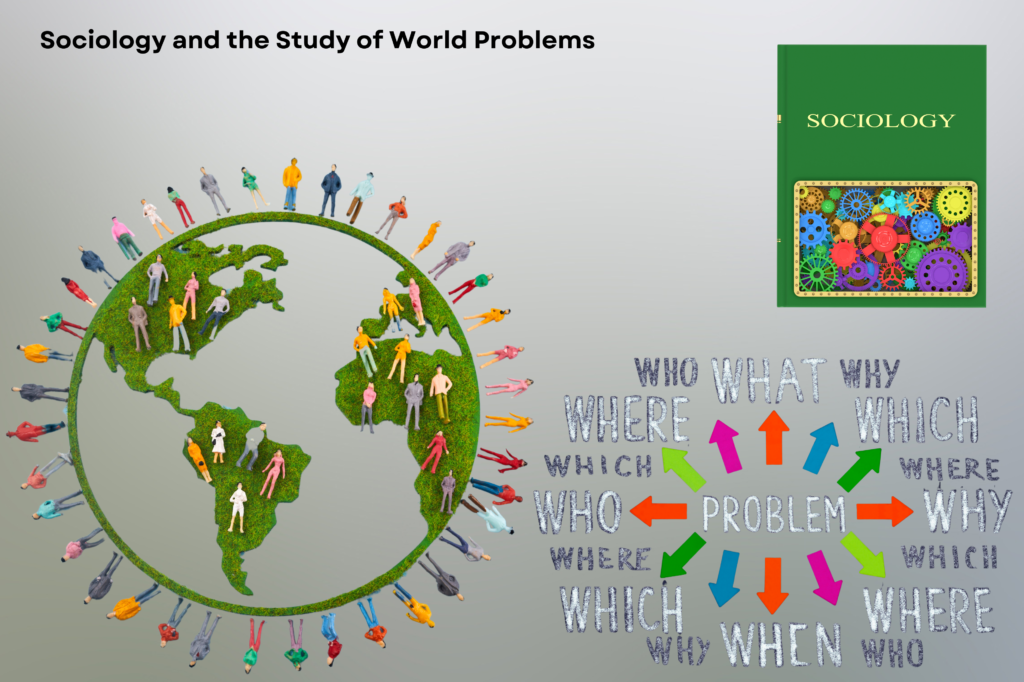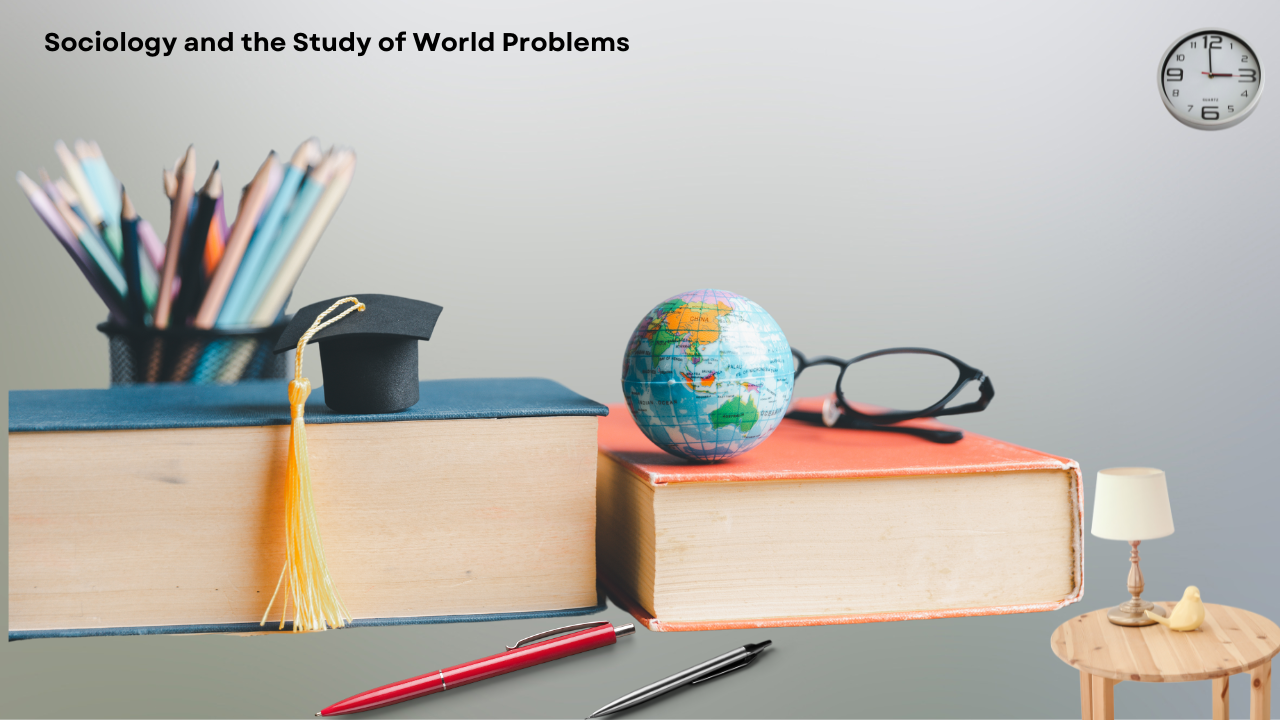If you want to understand the problems people worldwide face, it is critical to learn sociology. What it does is help show how different social forces, institutions, and connections shape the world and the issues it faces. Sociology helps us understand poverty, migration, unfairness, and climate change that affect people worldwide. This article examines the link between sociology and essential world problems and discusses how sociology can help us solve these problems.

What is sociology?
Sociology examines society, how people act, and how different individuals and groups interact with different social systems. Sociologists study how family, school, politics, the economy, and other social institutions affect people’s lives and play a part in more significant problems affecting people worldwide. Sociology tries to figure out how people do things, which is connected to how societies work.
How Sociology Relates to Global Issues
Sociology is essential for understanding global issues because it shows how social forces cause problems that impact people and nations worldwide. In their field, sociologists analyze how wealth, level of education, and access to healthcare affect individuals. Colonialism, economic policies, and various forms of government are all factors they look at as ways that these disparities remain over time.
Key Global Issues Explored in Sociology
Sociologists study many issues that affect people worldwide, such as human rights, poverty, injustice, war, and environmental damage. These issues occur all over the world. Sociology can teach us more about world problems, including what causes them, how they affect people, and how they might be fixed.
Global Inequality
The Sociological Study of Inequality
Global inequality is when countries and people do not have the same resources, chances, and rights. Sociologists study how people are grouped into social classes based on their income, schooling, and ability to get medical care. They also talk about how different types of government, economic policies, and colonization have kept these differences alive over time.
Economic Inequality Across Nations
Sociology can help us understand why some countries’ economies proliferate while others stay poor. Sociologists examine how globalization, trade policies, and multinational companies affect different countries’ economies and how emerging countries are affected by international organizations such as the World Bank and the IMF.
Addressing Global Inequality
Sociological studies can help lower inequality worldwide by shedding light on its causes. Focusing on education, social programs, and policy changes, governments and foreign groups can work to ensure that resources and chances are shared more fairly.
Migration and Refugee Issues
Migration in the Modern World
Migration is a big issue that has an impact on many people around the world. Sociologists examine economic opportunities, political unrest, and environmental problems to determine why people and families move. We can learn about the good and bad effects movement can have on the places people come from and go to through sociology.
Refugees and Displacement
People are forced to move because of war, persecution, or natural tragedies. It is called forced migration. Sociologists study the problems refugees face, how they adjust to new places, and the social, political, and economic issues that affect their lives. They also look at what foreign groups and governments can do to help people forced to move.
Sociological Insights on Migration Policies
Sociological research can help improve government policies about migration by showing how those policies affect groups of migrants. Policies about things like controlling the borders, giving people a safe place to stay, and integrating newcomers have significant impacts on the lives of migrants and the way people engage in countries that take them in.
Climate Change and Environmental Sociology
Sociology Can Help You Understand Climate Change
Climate change affects people worldwide, society, the economy, and politics. Environmental sociology is a field of sociology that examines how people’s actions, like manufacturing and cutting down trees, harm the environment. It also discusses how climate change affects weaker groups more than others.
Social Consequences of Environmental Degradation
Sociologists study how climate change affects society, such as how it worsens injustice. For example, towns with less money are more likely to move, need more food and water, and be affected by extreme weather because of environmental damage. We must understand how these social forces work to make fair and effective climate rules.
The Role of Society in Climate Solutions
Sociologists say that to stop climate change, we must change how we live and treat the land. It means encouraging long-term growth, reducing waste, and ensuring that certain groups are not involved in making decisions about climate policy. Sociology helps us understand how societies can change ways of life that are better for the environment.
Global Health and Disease
Sociology and Global Health Inequalities
Sociology is also critical in global health. Sociologists examine social determinants of health, such as income, schooling, and access to health care, to understand why some groups are likelier to get sick than others. They also investigate how healthcare systems and laws affect different groups’ health.
Researchers in sociology and pandemics
As the COVID-19 pandemic showed, sociology is vital to understanding and dealing with world health emergencies. Social workers looked into how the business, what people did, and how the government dealt with the virus affected its spread. They talked about how the pandemic affected places that were already struggling and people who were already on the outside.
Using sociology to deal with health disparities
Sociological study helps shape global health policies by identifying the societal reasons behind illness and unequal access to health care. Authorities and groups can work to improve everyone’s health by tackling the causes, like poverty and lack of access to health care.
World War and Conflict
Different sociological views on conflict
Sociology can teach us much about what causes and leads to world conflict. Sociologists study clashes between groups of people, power battles, and racial tensions that can lead to wars and other conflicts. If we understand these factors, we can work towards solutions that stop violence and support peace.
What War Does to Societies
Wars and other battles are very bad for countries. People die, people have to move, and these events hurt companies. Sociologists look at how wars change groups of people and places like hospitals and schools. They also examine what part foreign groups play and how towns get back on their feet after a battle.
Using sociology to deal with global conflict
Sociologists support ways to settle disagreements and address the social problems that cause violence. It means working for fairness in society, reducing inequality, and getting groups that don’t agree to talk to each other. Sociology studies can also help the world maintain peace and make plans that hopefully prevent future wars.
Conclusion
To sum up, sociology studies how people and groups communicate, which helps us figure out what problems happen and why. It shows how issues like poverty, unfairness, and violence are caused by the way people act and how society is set up. We can work toward a fairer, more peaceful world where everyone’s wants are met by using what we know about sociology to find better solutions.
